Main points
- County governments in Kenya have become hotspots for corruption. A number of county governors and country officials have been implicated in corruption cases over the years.
- Reports from the Ethics and Anti-Corruption Commission, Transparency International Kenya and the Kenya National Audit Office indicate the prevalence of corruption in counties, ranging from bribery, nepotism and patronage to embezzlement and mismanagement of public resources.
- Kenya has established anti-corruption legal and institutional framework that are useful to address corruption in counties. In addition, donor-funded devolution programmes have incorporated measures to support transparency and accountability in the country.


